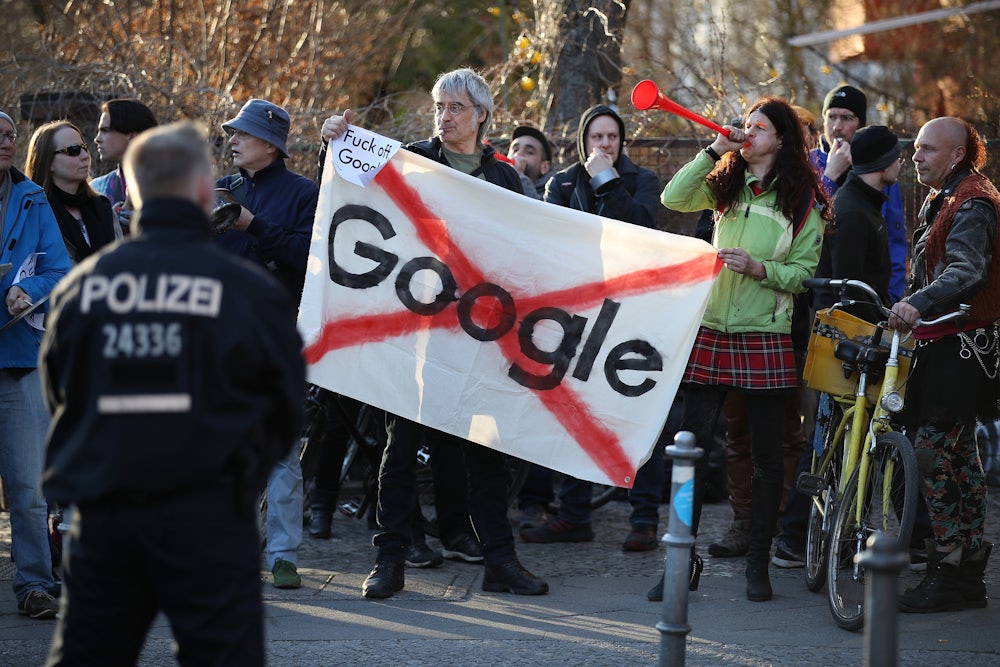Just two weeks ago, banners and stickers all over the neighborhood read, “Fuck off, Google.” Now, many simply say “Tschüss” (“Bye”).
In November 2016, the tech giant announced plans for a seventh Google Campus in the trendy Kreuzberg district of Berlin, following locations in London, Seoul, Madrid, Sao Paulo, Tel Aviv, and Warsaw. It eyed the Umspannwerk, a large former substation in picturesque brick on the banks of the Landwehr Canal: an epicenter of the hipster wave that’s hit Berlin since the late 1990s.
Local groups mobilized right away, fearing Google would turbocharge gentrification that has already sent rent prices soaring by 75 percent in just five years. GloReiche, a neighborhood collective, pointed at Google’s London Campus, which the collective claimed had sped up social cleansing in its Shoreditch surroundings.
Berlin, whose previous mayor famously called it “poor but sexy” in 2003, has arguably shed the “poor” part of that quote in a wild decade. Global capital has flooded in. Startups, wooed by cheap rent and a frenetic party scene (clubs that open on Friday night often do not close until Monday), have arrived by the dozen. By most metrics, Berlin now ranks second behind London among Europe’s leading tech hubs.
The change has not come easily. Gentrification, particularly in hip districts like Kreuzberg and neighboring Neukölln, has bumped living costs and displaced longterm residents. Berlin, 85 percent of whose 3.5 million residents rent, prevents drastic rent increases on existing tenants. But startups, around three quarters of which fail, come and go quickly, meaning landlords can hike prices again and again. Google, whose privacy infringements and what many perceive as tax avoidance have earned the ire of European Union lawmakers, has become a byword among Europeans for Silicon Valley greed—particularly for Kreuzberg’s electorate, over 75 percent of whom voted for far-left candidates at the most recent poll.
“There are some who believe in growth without regard, and suffer from startupitis,” says Theo Ioannidis, a councillor for The Greens, Kreuzberg’s most powerful political party. “They find it exciting that tech giants like Google or the Google Campus [settle] in Berlin.”
“But many worry that Kreuzberg thereby becomes even more expensive,” she adds. “It’s also about the fact that Kreuzberg stands for subculture and alternative lifestyles. And they are more and more threatened by the colonization of huge, multinational companies that like to use this image.”
Soon after Google’s announcement in 2016, protests popped up. Groups published pamphlets and flyers. Google stayed silent. In September this year, a small group of activists tried to occupy the Umspannwerk before police ejected them. Then, on October 24, Google announced it would continue to hold the building’s lease, but hand over operations to Betterplace and Karuna, two social nonprofits.
The majority of locals hailed a victory for grassroots protest. “I believe that Google was really bewildered by the resistance,” says Stefan Klein, a GloReiche member. “From the start they tried to dismiss it as the ideologically-based struggle of a few activists. Yet during the resistance they learned that a broad section of the neighborhood did not agree with the settlement. No wonder they ended up looking for a face-saving solution, in which they wanted their retreat from the Google Campus in Kreuzberg project to look like a social good deed,” Klein adds.
This is not the first time Berlin has bitten back against tech. In April 2016, its assembly barred almost all landlords from leasing to short-term renters, a move directed at Airbnb. This March, the rule was overturned, but landlords still face significant restrictions. Until recently, the sight of an Uber on Berlin’s streets was rarer than a salmon schnitzel, due to taxi protests that had varying degrees of success across Europe.
Privacy, in a country that has suffered the Gestapo and Stasi, is a further reason to shun tech. Only 46 percent of the country uses social media, compared to 71 percent of Americans. Take a stroll through Kreuzberg on Google’s Street View, and you’ll find plenty of buildings blurred out.
As the penny drops, globally, that tech giants are no longer the socially-minded saviors many once believed them to be, Europe’s governments have been far tougher in fighting alleged antitrust, tax, and employment issues than their American counterparts.
Google’s decision has hardly spared the Umspannwerk from gentrification: It is already home to a high-end restaurant, where hipsters bring their vacationing parents. Across the street is a trendy bouldering club, while the area is dotted by bare-walled cafes that serve up premium, Ethiopian drip-coffee to black-clad clubbers.
Neither is it a sign that tech multinationals aren’t welcome in the wider city: Just hours after the Kreuzberg decision, a spokesman from the center-right Christian Democratic Union, Angela Merkel’s party, offered Google the chance to pitch up in Lichtenberg, a former East German neighborhood home that was home to the feared Stasi secret police. Last week Siemens announced plans for a $678 million “Innovation Campus” in the edge of adjoining Spandau.
But Berlin’s rent controls and its deep-rooted, far-left political tradition (Kreuzberg’s May Day festivities draw tens of thousands yearly) have helped many of Kreuzberg’s quirkier businesses survive, amid change that would surely have felled them in Williamsburg or Shoreditch. Heisse Scheiben (“Hot Slices”) is a longtime vinyl and CD store opposite the Umspannwerk. Owner Achim Koppisch is “happy” Google didn’t arrive on his doorstep. “Google Campus would make gentrification much faster,” he says. “It won’t be stopped. But Kreuzberg is something different; special. There will be a lot of fighting for the preservation of that famed character.”
That Kreuzberg’s anti-gentrification protests succeeded where so many around the world have failed likely involves multiple factors: Germany’s unusually high level of Google skepticism, the incentives created by Berlin’s rental market, perhaps Google’s own interest in avoiding controversy right now. Yet the sheer commitment in this community of anarcho-communist bookstores and socialist punk vinyl shops probably helped.
“Should Google want a presence in this neighborhood after five years,” Klein says, “we will destroy that hope.”
